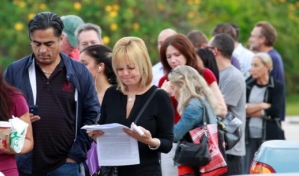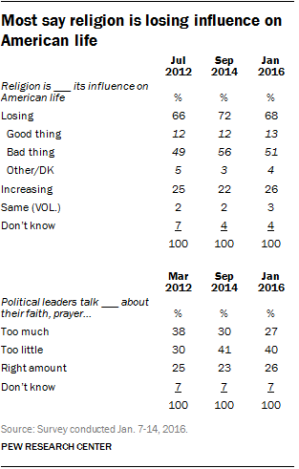Results from a new Pew Research Center survey released Wednesday (Jan. 27) indicate several of the U.S. presidential candidates currently leading the polls of both main political parties are not perceived as intensely religious individuals.
The new survey, referenced as Faith and the 2016 Campaign, was conducted Jan. 7-14, 2016, among 2,009 adults. It found the leading Republican presidential candidates are more widely viewed as religious people than are the Democratic candidates. Donald Trump is not widely seen as a religious person, even by those in his own party, according to the survey. Just 30 percent of U.S. adults in the survey view Trump as a religious person.
Some 52 percent of white evangelical Protestant voters (regardless of party affiliation) said they think Trump would be a good president. In a separate question, however, two-thirds of Republicans said it's important to have a president that shares their religious beliefs, reports CNN. Evangelicals express a similar degree of confidence that Carson (52 percent) and Cruz (49 percent) would be successful presidents. They are less convinced that other Republican candidates would be good presidents.

Few evangelical voters think Bernie Sanders (16 percent) or Clinton (15 percent) would be good presidents, according to this survey response.
Roughly two-thirds of adults, or 68 percent, said they think Ben Carson is "very" or "somewhat" religious while 65 percent said the same about Ted Cruz and 61 percent think Marco Rubio is a religious person.
By comparison, 48 percent of adults said they believe Clinton is a religious person, and 40 percent think Bernie Sanders is "very" or "somewhat" religious. The share of Americans who said Hillary Clinton is not a religious person now stands at 43 percent, which is sharply higher than it was in the summer of 2007, when she was seeking the presidential nomination for the first time.
The survey also indicated 68 percent of U.S. adults believe that religion is losing influence in American society. And most who hold this view - 51 percent of all U.S. adults - stated they think religion's declining influence is a bad thing for American society.
Responses also showed 40 percent of Americans think there has been too little expression of religious faith and prayer by political leaders, compared with 27 percent who said there has been too much religious talk by politicians. These figures are considerably different from the results of a survey taken at a similar point in the 2012 presidential election cycle. At that time, more people thought there was too much religious discussion (38 percent) than who said there wasn't enough (30 percent).
The share of American adults who say they would be less likely to vote for an atheist candidate has been declining over time.
Fifty-one percent of people surveyed in this new poll said they would be "less likely" to vote for a hypothetical candidate if that candidate were an atheist. A Muslim candidate would likely lose the support of 42 percent of people, and an evangelical Christian would lose the support of 20 percent of people.
Other key findings of this new survey include:
Candidates are viewed as religious by more people in their own party than the opposing party. The biggest partisan gap on these questions is seen in views about Hillary Clinton; two-thirds of Democrats say she is "very" or "somewhat" religious, while two-thirds of Republicans express the opposite view, saying that she is "not too" or "not at all" religious.
Half of Americans (51 percent) believe religious conservatives have too much control over the GOP, and more than four-in-ten (44 percent) think that liberals who are not religious have too much control over the Democratic Party. Two-thirds of Democrats say the GOP has been co-opted by religious conservatives, while most Republicans reject this notion. Conversely, two-thirds of Republicans believe that secular liberals have too much power in the Democratic Party, while two-thirds of Democrats disagree.
One-quarter of adults (26 percent) says they would be less likely to vote for a gay or lesbian presidential candidate, while 69 percent say it would make no difference to their vote. Since 2007, the share of Americans who say a candidate's sexual orientation would not matter in their vote has been steadily rising, while the share who say they would be less likely to support a gay or lesbian candidate has been declining.
There are more than twice as many Republicans who say they would be less likely to support a presidential candidate who has been an elected official in Washington for many years as who would be more likely to support such a candidate (44 percent vs. 18 percent). Among Democrats, the balance of opinion leans in the opposite direction; 27 percent see extensive Washington experience as a positive, compared with 19 percent who see it as a liability.






![[Exclusive Interview] A revelation within the brink of life and death — Meg Leung’s mission in Christian art](https://www.gospelherald.com/media/cache/thumbnail/7/21/72163sp_273w_150h_1x_1y.jpg)

